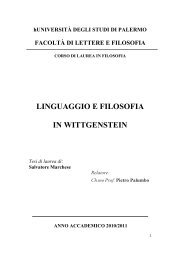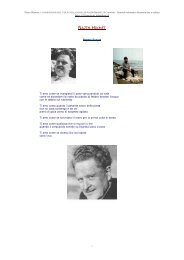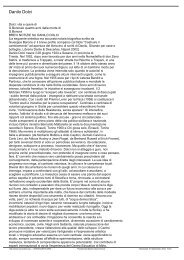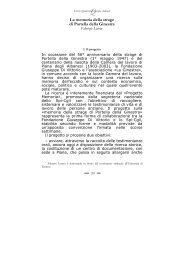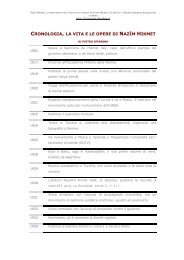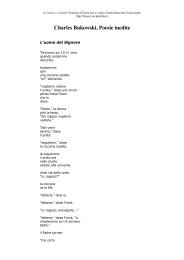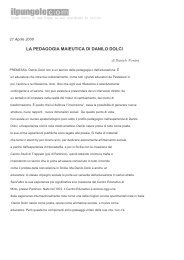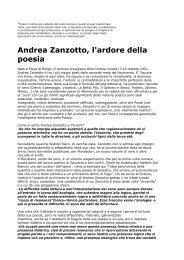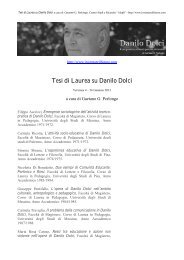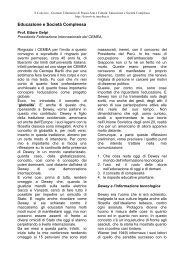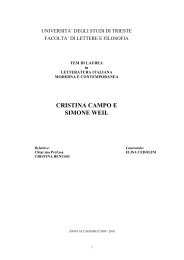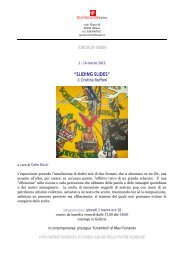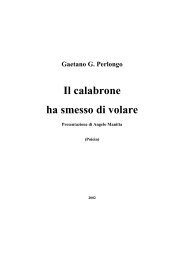Speciale Sardegna - Centro Studi e Ricerche Aleph
Speciale Sardegna - Centro Studi e Ricerche Aleph
Speciale Sardegna - Centro Studi e Ricerche Aleph
Create successful ePaper yourself
Turn your PDF publications into a flip-book with our unique Google optimized e-Paper software.
Dalla silloge "Backwards" di Piero Scaruffi<br />
Traduzione di Corrado Cantelli<br />
Backwards, backwards<br />
makes more sense.<br />
I don't know why this poem<br />
was left unfinished<br />
1. Tinfoil Dialogue<br />
Please do not answer me.<br />
Time challenges us<br />
ever since we have been<br />
[speaking<br />
this language we don't<br />
understand.<br />
We, unborn,<br />
like water evaporating<br />
to prove our invisible lives,<br />
flow away through our names<br />
out of our range, beyond the<br />
[edge,<br />
a mistake that will never<br />
turn into a resolution.<br />
You'll find out<br />
I never told you my real name,<br />
and you'll pull the trigger.<br />
Because I know that<br />
all the shadows that<br />
rise from you<br />
will some day fade away.<br />
Let us not speak of this<br />
[anymore,<br />
it will never come back.<br />
All the time this echo<br />
has trailed back to us,<br />
has been expecting us to listen,<br />
like two deaf eternities.<br />
"It is not the light,<br />
it is the darkness that blinds<br />
[you."<br />
(“Mottos of the Afterlife”)<br />
(…)<br />
8. Astral Swoon<br />
The subject of this poem<br />
is itself.<br />
Like the convulsed clutch<br />
of a drowning man.<br />
Darkness surrounds me.<br />
I am a blind man<br />
reading the Braille book<br />
of the universe;<br />
a clown, perhaps,<br />
babbling his jokes<br />
in a deserted circus;<br />
a grinning skeleton clung<br />
to the helm of a ghost vessel<br />
adrift in the hurricane.<br />
I perceive the transparence of<br />
the world<br />
changing to the light in which I<br />
perceive it.<br />
A ritroso, a ritroso<br />
ha più senso.<br />
Non so perché questa poesia<br />
rimase incompiuta<br />
1. Dialogo di Stagnola<br />
Ti prego non rispondermi.<br />
Il tempo ci sfida<br />
fin da quando parliamo<br />
questo linguaggio che non<br />
capiamo.<br />
Noi, non ancora nati,<br />
come acqua che evapora<br />
a dimostrare le nostre vite<br />
[invisibili,<br />
scorriamo troppo lontano<br />
fra i nostri nomi, oltre il limite,<br />
un errore che mai<br />
diventerà una soluzione.<br />
Scoprirai che non ti ho<br />
mai detto il mio [vero nome,<br />
e premerai il grilletto.<br />
Perché so che<br />
le ombre che<br />
si allungano da te<br />
un giorno svaniranno.<br />
Non parliamone più,<br />
non tornerà mai.<br />
Per tutto il tempo questa eco<br />
è strisciata verso di noi,<br />
si aspettava che ascoltassimo,<br />
come due sorde eternità.<br />
"Non è la luce,<br />
è l'oscurità che ti acceca".<br />
(“Motti dell’Aldilà”)<br />
(…)<br />
8. Svenimento Astrale<br />
Il soggetto di questa poesia<br />
è se stessa.<br />
Come la convulsa stretta<br />
di un uomo che affoga.<br />
L'oscurità mi circonda.<br />
sono un cieco<br />
che legge il libro Braille<br />
dell'universo;<br />
un clown, forse,<br />
che mormora i suoi scherzi<br />
in un circo deserto;<br />
la presa stretta di uno scheletro<br />
[che sorride<br />
al timone di un vascello<br />
[fantasma<br />
alla deriva nell'uragano.<br />
Avverto la trasparenza del<br />
[mondo<br />
che cambia nella luce in cui lo<br />
percepisco.<br />
Progetto Babele Dodici<br />
- 92 -<br />
I perceive myself<br />
at the end of the trail,<br />
folded in fire,<br />
my mind decomposed<br />
into primitive thoughts,<br />
my time receding<br />
to infinite childhood.<br />
I am silent again, dumb.<br />
Where did the echoes<br />
of all my words fall ?<br />
I no longer exist.<br />
Or, maybe, I didn't exist<br />
in the first place,<br />
and that's why this poem<br />
was left unfinished.<br />
"The last step is often<br />
the first one."<br />
(“Mottos of the Afterlife”)<br />
At the end of the path<br />
curled barefoot<br />
in the luminous shell<br />
of the night, I shall reach<br />
the infinite sunflower<br />
of your face<br />
rising once again<br />
to greet me<br />
on the threshold<br />
of eternity.<br />
"Everybody is a sign for<br />
something."<br />
(“Mottos of the Afterlife”)<br />
Percepisco me stesso<br />
alla fine del sentiero,<br />
piegato nel fuoco<br />
la mente decomposta<br />
in pensieri primitivi,<br />
il mio tempo retrocede<br />
all'infanzia infinita.<br />
Sono di nuovo al silenzio,<br />
[intorpidito.<br />
Dove sono caduti<br />
gli echi di tutte le mie parole?<br />
Non esisto più.<br />
O, forse, non esistevo<br />
[all'inizio,<br />
ed ecco perché questa poesia<br />
fu lasciata non finita.<br />
"L'ultimo passo è spesso<br />
il primo".<br />
(“Motti dell’Aldilà”)<br />
Dalla silloge "Poems For Angels" – Piero Scaruffi<br />
Traduzione di Corrado Cantelli<br />
B o o k P r e v i e w<br />
Tokyo, andata e ritorno<br />
Di Marco Montanari<br />
Ed. Sovera Multimedia<br />
(pubblicazione prevista Novembre 2004)<br />
Alla fine del sentiero<br />
ondulato, a piedi nudi,<br />
nel guscio lucente<br />
della notte, raggiungerò<br />
l'infinito girasole<br />
del tuo viso<br />
che s'innalza ancora<br />
per salutarmi<br />
sulla soglia<br />
dell'eternità.<br />
"Ognuno è un segno per<br />
qualcosa."<br />
(“Mottos of the Afterlife”)<br />
Il romanzo racconta il primo viaggio a Tokyo di un turista italiano<br />
di nome Guglielmo, un neolaureato in economia assolutamente<br />
ignaro di tutto quello che riguarda il Giappone.<br />
Per un caso di omonimia, la prevista tranquilla settimana di<br />
soggiorno giapponese diventa un'avventura fatta di fughe e<br />
tradimenti.<br />
Una ragazza italiana, appassionata di manga e esperta del<br />
Giappone, lo aiuterà e gli farà da guida mostrandogli una Tokyo<br />
diversa e inaspettata, normalmente ignorata dai turisti.<br />
L’autore<br />
Marco Montanari è nato a Roma nel 1973. Nel 1997 si è laureato in<br />
lettere moderne all'università la Sapienza di Roma. In seguito ha<br />
conseguito un master in storia giapponese a Tokyo, città dove tuttora<br />
vive. Dal 1999 insegna italiano, storia contemporanea e teatro all'Istituto<br />
Italiano di Cultura a Tokyo. Inoltre lavora anche come traduttore dal<br />
giapponese all'italiano e dall'inglese all'italiano. Ha pubblicato il testo<br />
teatrale Basta domandare (Sovera Multimedia).




